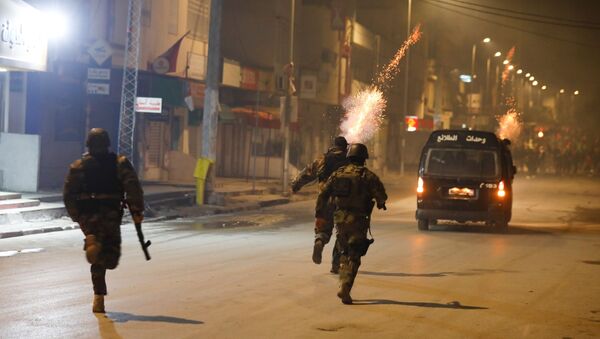Protests continue in Tunisia, with hundreds gathering outside the parliament in the capital city of Tunis. One group of protesters marched to the parliament from the working-class district of Hay Ettadhamen. Authorities identified a young demonstrator who died from injuries on Monday night. Haykel Rachdi’s family told local media that he died after he was struck on the head by a police tear gas canister. The Public Prosecutor’s office in the Kasserine governorate ordered an autopsy to confirm the cause of Rachdi’s death.
After the death of the young man, a group of protesters tried to storm a police station in the city of Sbeitla. The news of the man's death escalated tensions in the country.
Why Are Tunisians Protesting?
Massive demonstrations began in the country on the 10th anniversary of the Tunisian revolution, part of the so-called Arab Spring protest movement that rocked the Arab world in 2011. Although Tunisia has been lauded as an Arab Spring success story, people marching across the country now are chanting the same slogans used ten years ago and berating the government for the low standard of living. In 2020, Tunisia’s economy contracted by 8.2 percent, while fiscal debt rose above 12 percent. Unemployment among youth, which constitute a hefty demographic among the protesters, ballooned to over 30 percent. The protests also coincide with the imposition of a national curfew aimed at slowing the spread of the coronavirus pandemic.
The situation was exacerbated by a heavy-handed law enforcement response, including tear gas, water cannons and batons used against protesters, regardless of whether marchers were peaceful or violent.
"The government that only uses police to protect itself from the people - it has no more legitimacy", noted a protester.
The Tunisian Human Rights League said about 1,400 people have been so far detained in the demonstrations. Approximately 30 percent of this number are minors, the association observed.
In response to the protests, Prime Minister Hichem Mechichi pledged to introduce economic reforms, reshuffling the cabinet by naming 11 new ministers. The president, Kais Saied, however, rejected Mechichi's move, stating that he would not swear in the new officials. Without naming names, Saied observed that several of Mechichi's appointees have been accused of corruption and others display conflicts of interest. The president also pointed out that the PM's new cabinet appointees did not include any women.




